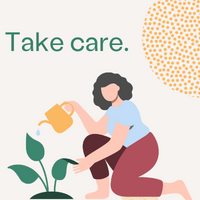Self-care strategies for Mental Health Awareness Month
05.26.22
Category: Self-care and Support, Therapy
Type: Blog
05.26.22
Category: Self-care and Support, Therapy
Type: Blog

Sexual assault often takes a tremendous toll on both physical and mental well-being, increasing a survivor’s risk of serious conditions like post-traumatic stress, anxiety and depression.
KCSARC is a community mental health provider that specializes in helping survivors recover. We know that collectively, mental and behavioral health has reached a crisis point, worsening during the pandemic. The struggle, as they say, is definitely real.
May is Mental Health Awareness Month, so we want to focus on simple ways to address the everyday stress in our lives, whether related to sexual assault or not.
Recognize stress symptoms
The first step toward managing stress and building resilience is recognizing the symptoms of stress. These can be physical, emotional or behavioral. Some symptoms to watch for: body tension or overall stiffness, mood swings, changes in sleeping patterns. Self-destructive behaviors, including drug or alcohol abuse, are rooted in stress.
For sexual assault survivors, signs of stress can appear immediately following the assault — or weeks, months, or even years later. Stress can resurface with “triggers,” such as the anniversary or other reminder of the assault.
Family and friends of a survivor can also experience stress due to the assault of a loved one. It’s important not to overlook or minimize the impact stress can have on family members and friends in this situation.
What Can Help
Relaxation techniques can help alleviate stress, and this is a good time to start putting them in practice. A few you can try when you’re feeling the symptoms of stress: